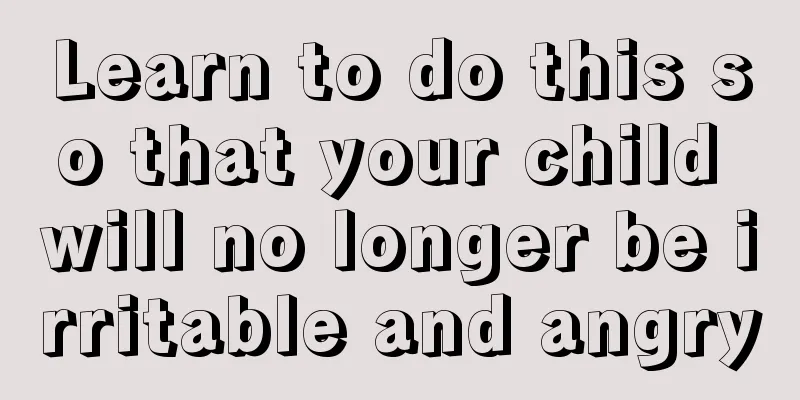Learn to do this so that your child will no longer be irritable and angry

|
Nowadays, it is very common for children to lose their temper easily, and many parents are at a loss as to what to do. In fact, as long as you find the right method, the problem can be easily solved. First of all, we need to do a good job of prevention, find out the reasons why children lose their temper, calmly analyze and divert their attention, then learn to control yourself and communicate with your children in a humorous way. Children will naturally learn to be obedient slowly. 1. Do a good job of prevention It seems easier to stop the storm before it arrives. Many times, children's tantrums can be avoided, for example, by asking them what they want before setting rules. "You want more juice, you like that juice, right?" (See, you've got his nod, yes!), and then state the rule: "Okay. But you need to eat more eggs before you can drink more juice, okay?" This usually works better than asking him to eat eggs when you know he doesn't like them. So, we recognize the signs that our child is about to have a tantrum and nip it in the bud. 2. Distraction Distraction often helps children 3 years old or younger. Giving children toys or starting a recreational activity can divert their attention away from the tantrum. Children at this age do not understand cause and effect, so discussing it will be useless. 3. Take a short break Keeping your child away from anything, object or person that causes the tantrum gives them the opportunity and space to calm down, which is a skill worth learning. Let a younger child lie down and play with toys or sit quietly with him or her in your arms. For older children, you can teach them self-soothing techniques, such as deep breathing and counting to 5 to 10 before speaking. 4. Self-control It is difficult for parents to remain calm when their children are having a tantrum. If you feel yourself becoming agitated, step away from the situation, take a deep breath, and give yourself time to relax. Children learn more from their parents' behavior. 5. Humor Humor is a good way to mediate conflicts. If you notice that things are going badly, doing something funny and entertaining at the right time might help. Never laugh at a child. There is no reason that justifies laughing at or scolding a child. 6. Talk about feelings It is often difficult for young children to talk about and express their emotions; they may not even know what they are feeling, which inadvertently increases their confusion and fear. Help children understand and talk about their feelings, tell them that everyone feels upset and anxious, and that they should tell their parents that losing their temper will not solve the problem. Parents can also guide their children to talk, such as asking questions like "What happened?" or "Are you feeling sad?" or asking children about ways they can calm down. Finally, when your child is angry, remember that all that anger is a cover-up and defense against more uncomfortable feelings—vulnerability, anxiety, fear, sadness, grief. If you can get him back to the feelings that are masked by the anger, his anger will disappear. "You don't want Mommy to leave, do you? You'll miss me when I leave, right?" Your child may then cry, and you can hold him or her and comfort him or her. Make sure your child feels your full love and attention. Children who lack love and a sense of security are more likely to lose their temper. |
<<: If a child has tooth decay pain, distinguish the severity and then treat it
>>: How to care for children with colds and repeated fevers?
Recommend
What causes children to snore while sleeping?
The quality of sleep for children is very importa...
What should I do if my child has dark yellow skin?
Children's skin is generally fairer and smoot...
What to do if a child has a fever of 375
If your child's fever has reached 37.5 degree...
What should I do if my baby always has a fever?
There are many reasons why children have recurren...
What are the commonly used medicines for children?
Children have weaker resistance, so they are pron...
Can hydrocephalus in newborns be treated?
Hydrocephalus is a symptom of water accumulation ...
At what age can babies eat taro?
Taro contains many nutrients and is also an alkal...
Child vomiting and diarrhea
Vomiting and diarrhea are common symptoms among c...
What should I do if my baby has a recurring high fever?
The answer to the question that many mothers are ...
What to do if your child has swollen abdominal lymph nodes
Abdominal lymphadenopathy in children is a common...
What is the correct way to feed your baby?
Many mothers of newborns are inexperienced and do...
Symptoms of cold abdomen in baby
For every family that has just had a baby, daily ...
What to do if your baby has flat warts
Flat warts are a skin disease that is extremely h...
What is the cause of the heart murmur during the baby's physical examination?
A family often pays the most attention to its chi...
What should I do if my child has a fever after vaccination?
Getting vaccinated is a very good thing, as it ca...









